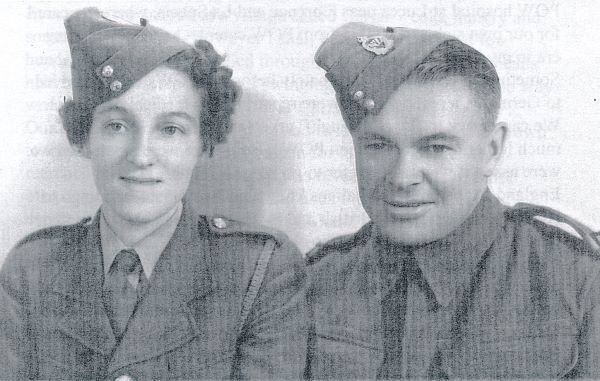
Jack Silcock – Prisoner of War, part II
-
In October 2023 we printed the first part of an article based on a memoir written by Jack Silcock of Cambridge. Soon after his marriage to Lola, he was serving in a medical unit in Libya. He and his medical unit were captured and had spent eight months in a prison camp in Italy, before he was given the order to leave for an unknown destination. His story continues.
“We firmly believed that for us, prison life was over. We were going to be repatriated[1] we were sure,” he wrote. But instead they were taken north to the “Ospedale Militare” at Lucca – an understaffed military hospital set up three weeks ago. “Naturally we were a trifle disappointed … but some irrepressible spirits soared again and we took the philosophical attitude that if there was a job to be done here, well, we would do it.”
The patients were English, South African and French POWs[2], and some were in a bad state. Seeing 106 of their own men arrive to look after them considerably raised their morale.
Jack was put in charge of Ward III and had a staff of 21 for 100 patients. Two Italian doctors, two orderlies and a suora[3] were also on each ward. They divided themselves into shifts – morning, afternoon and night, and settled into a routine.
At first, the suora oversaw the linen, the cleaning and the food. Sanitary arrangements were two bed pans and four bottles for 100 men. The cleaning was done with inadequate straw brooms. Jack’s frustration is obvious, but “the more we endeavoured to improve [the lot of the patients] the more they demanded, and the more we tried to get things from the Italians for them, the more we were kowtowing to our captors – an invidious position.”
Gradually, Jack and his friend Don Rankin started to pick up the Italian language. They were able to converse with their captors and, importantly, could translate Italian news reports about the state of the war and the growing resources of the Allies. Unfortunately, some of their own men were jealous and at times abusive to those who used the language. “However, that is life and human nature is a queer thing.”
Jack and Don did not confine themselves to shifts; they worked all day and often into the night. They enjoyed it. It filled in time, gave them a chance to learn the language and helped them forget about the barbed wire outside. Sometimes they were called out in the middle of the night, and the Italians considered them as two extra night orderlies.
But their hard work was paid back with kindness. Their suora Zelinda recommended them to her Mother Superior, who squeezed two extra beds in the ward for them. Beds, mattresses and sheets were a well-earned luxury. Eventually, they were given their own room, where Zelinda would prepare meals for them, supplementing spiced meat, cakes and other titbits. She cleaned, ironed and darned their clothes whenever she had the opportunity. Zelinda became their respected friend.
Another friend was Italian Lieutenant Aldo Chedini. As a civilian he was an accountant in Florence. He was intelligent, widely read and heartily sick of the war. When he was Orderly Officer, he would join Don and Jack in their room, with Australian Ted Broomhead, for tea and cigarettes. They discussed everything from the state of Mr Churchill’s health to Hitler’s latest crime. “There were no barriers and there was a gentleman’s agreement that much that was discussed was confidential.” The only beer they tasted in Italy was from Chedini: first on Christmas Day 1942, and then the night before they were repatriated.
Jack wrote that the three Italians he would be happy to meet again were Zelinda, Chedini and Arturo. Arturo was an orderly who was a masterly trader with the patients, bringing in tomato sauce, pipes, razor blades, etc which he sold for articles from Red Cross parcels. He would buy the tomato sauce for 10 lira and swap it for a cake of soap, which he sold outside for 25 lira, so he did good business – even better when the POWs were able to receive parcels from their next of kin. Jack described him as “a likeable fellow – big, red faced and dull witted, but I think I had more laughs out of Arturo than from anything else in Italy.” Arturo was not good with numbers or reading. He came to depend on his English friends for tallying his transactions, and for keeping him up-to-date with Italian news. When asked what he would do if Italy was invaded by the British, he said, “I would put on khaki and fight with them.” Jack wrote that that summed up many Italians’ opinions.
The most dangerous thing Jack felt that he and Don did was to arrange someone to take a photograph of Zelinda and the Mother Superior. Cameras were strictly forbidden, so Don approached Arturo who contacted a sympathetic photographer. Jack wrote “God knows what would have happened had we been discovered – shot probably.” But they got their photograph.
“We were reasonably happy, apart from the ever present longing for our wives and families and missing only our freedom and real New Zealand square meals. Christmas and New Year’s Eve 1942/43 came and went in a flash of amazing conviviality. We all managed to become fairly tight[4] and passed the festive season in the true spirit. On those nights all discipline was relaxed to a certain extent and one incident I shall always remember – that of a prisoner of war taking over an Italian guard’s greatcoat, rifle, hat and ammunition while the guard departed to buy a couple of bottles of wine for the prisoner.”
Jack Silcock was proud of his home country and took representing New Zealanders abroad seriously. His hard-working demeanour and positive outlook meant that he made the most of his time as a Prisoner of War in Italy. He wrote that after his repatriation, on his trip home via Egypt “four of us hired a taxi and visited the Holy Land. So we swam in the Sea of Galilee, visited the sacred places and realised how lucky we were to have the opportunity to do so.”
At last he boarded the hospital ship “Maunganui” and headed for home. “No city in the world could have looked better than Wellington as we lined the rails and felt the touch of the wharf as it met the side of the ship. We disembarked and I searched the faces for a glimpse of Lola. Not a sign. Then a tap on the shoulder. I turned around and there she was in her khaki uniform. “Hello darling. Welcome home.” It was over.”
[1] Sent home
[2] Prisoners of War
[3] Nun
[4] Affected by alcohol
Photo: Lola and Jack Silcock in 1943 after repatriation. From Jack Cedric Silcock, His Life CM2462
Taken from a memoir written by Jack Silcock in 2001 about his WWII Prisoner of War experiences, this article was written by Karen Payne for the Cambridge Historical Society Newsletter of April 2024.
